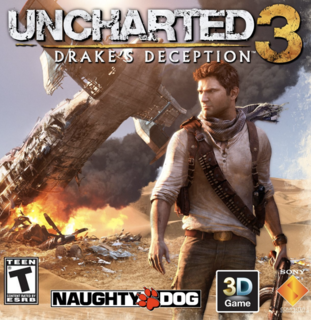The sequel to the Playstation 3's best adventure game makes a big splash. The Atlantis of the Sands awaits.
However, it is incredibly difficult to recreate that sensation of wonder. Uncharted 3, like many sequels to brilliant masterpieces, does almost everything well -- but a little extra bit of magic is missing.
In plot, character development, and game mechanics, Drake's Deception is eerily similar to its predecessor. Drake et al. are hunting for a fabled lost city once more. Along the way, he'll platform through spectacularly rendered, impeccably crafted levels; solve puzzles (with the aid of his notebook, which heavily hints at the solution); and fight off hordes of heavily-armed mercenaries. The game's high points are a series of elaborate set-pieces which mix all three, along with fast-paced disaster porn (e.g., escaping out of an immense cruise-liner sinking into the sea, as the ship rotates and completely unseats your sense of how to interact with an environment).
Though the story arcs of all three games are structurally identical (seek treasure, encounter enemy racing Drake to find the treasure, realize the treasure has some dark element, prevent enemy from achieving objectives), the stars of the series have developed over time. In Drake's Deception, we get some interesting insights into the character's childhood. One level, a flashback, shows a pre-teen Drake and Sully's first meeting. Overall, a new theme of this game, as opposed to the first two, is to question the psychology and motivations of our handsome leading man. After several death-defying encounters, various friends and co-conspirators ask Drake why he continues to pursue his goals so unrelentingly. It's an interesting angle to take, and one that unfortunately isn't explored fully enough, ultimately dropping out in the final third of the game (even as some of the most ridiculous, dangerous events occur).
The other major change to the game is its "improved" melee system. While this is more nuanced than Uncharted 2, with counters, grabs, and environmental attacks (e.g., slamming someone into a table or counter if they're close enough), the game falters somewhat by indicating what moves you have to make on the screen itself. That is, when you have an opportunity to counter, the Triangle button symbol flashes in the lower-right-hand corner. This seems like an awkward mechanic that jars one out of the game world too much. Something like the mechanism of the Batman: Arkham games, where a symbolic indicator flashes over the enemy's head, may have been subtler and made you feel less like the game was bluntly telling you what you should do.
The bottom line here is this. If you loved Uncharted 2, this game is a no-doubt purchase, and fans of the series have to respect the fact that Naughty Dog manages to hit all the right notes, with several action sequences that are the equal of Among Thieves' finest.
With that being said, the flaws of the first two games in this series shine through a little more clearly in this one. While I was utterly absorbed by Uncharted 2, I found myself more removed -- even detached -- from this adventure at times.
Other reviews have already noted several criticisms that strike me as accurate. First, the game is quite easy, and you consistently feel as if your hand is being held by the game's unsubtle prodding. It is even easier than the second game, which is really saying something. (Obviously you can put it on a higher difficulty, but this is largely an artificial fix -- it doesn't make enemies that much more intelligent, it just makes your bullets weaker.) As earlier mentioned, the melee system sometimes jars you out of the experience and makes you feel like the game is playing itself, or being played for you, by too garishly signalling what moves you are expected to make.
Second, the cinematic quality of the series -- which is also, paradoxically, its strong suit -- does make you feel sometimes as if you're just getting in the way of an amazing movie. Every time you fall or get caught during an epic escape, you can imagine the game's developers wincing at the fact that you just ruined the pacing of the moment.
Finally, the shooting controls are a little awkward -- I was never completely used to them even by the end of the game, and they could be a little tighter. I understand the developers have subsequently introduced a patch to fix this ineffable but definitely noticeable awkwardness, and reports that I've read indicate that these have solved the problem to some extent.
The puzzle for me, as a subjective matter, is that all these criticisms applied to the second game. I don't think they entirely undermine the quality that shines through Drake's Deception; but, with the novelty somewhat worn off, they do dim its light just a little bit.

